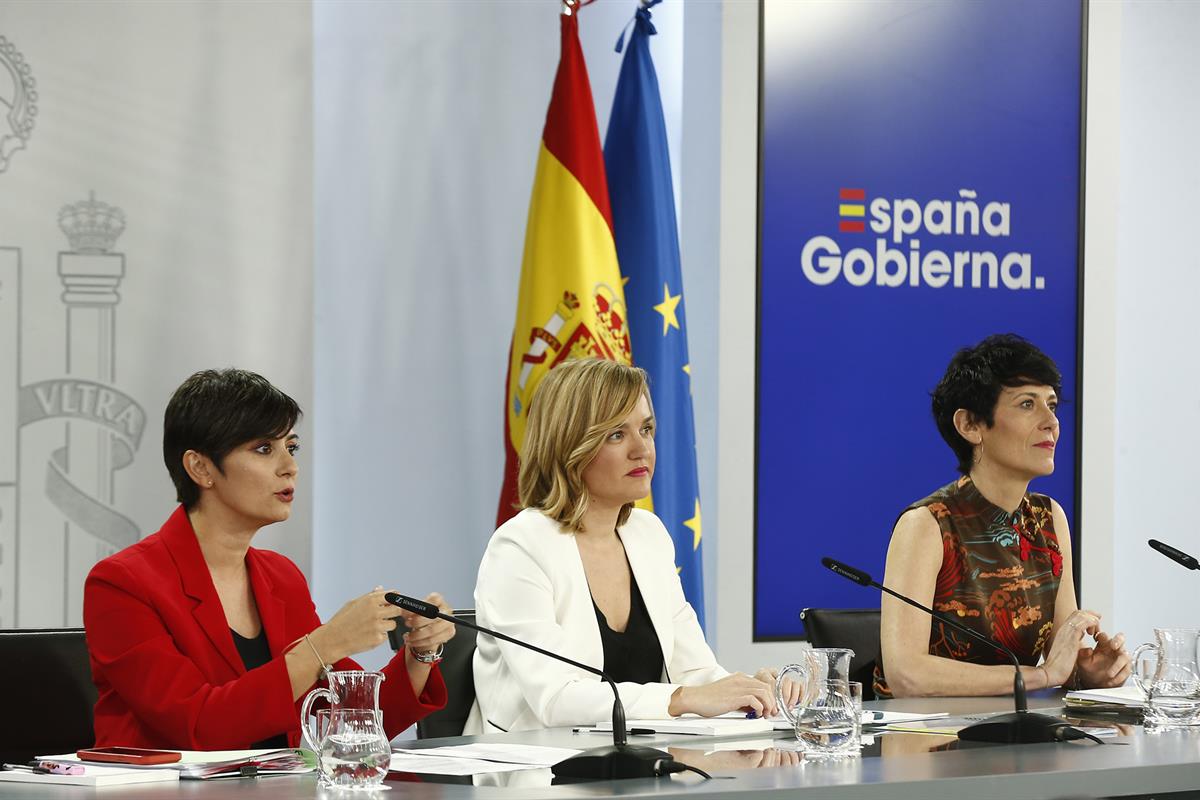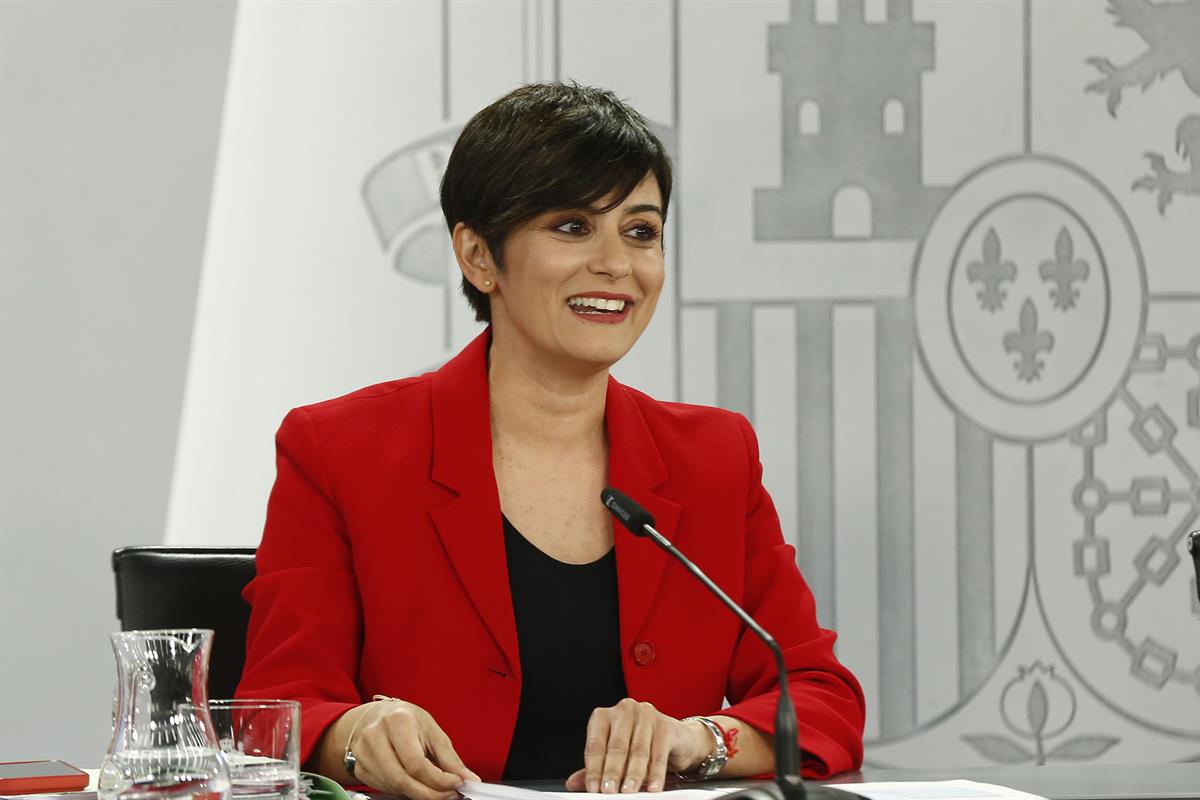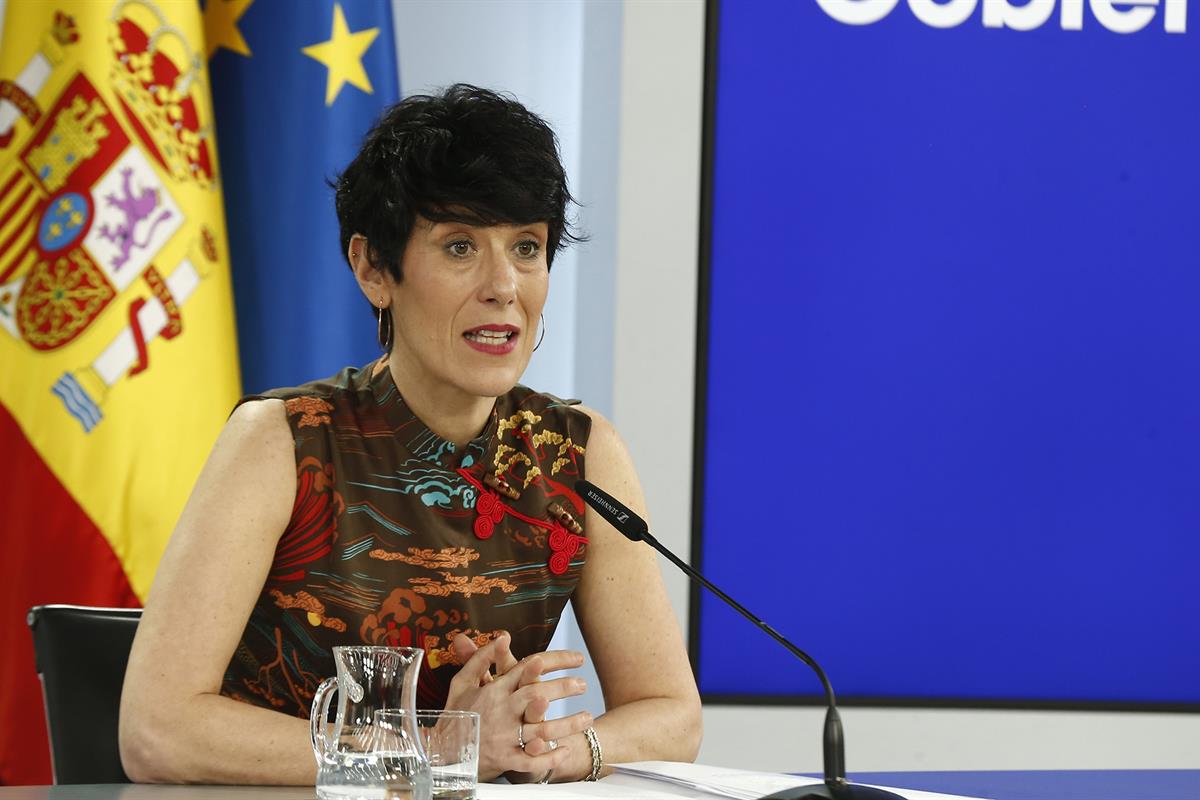Council of Ministers
Government pushes for elimination of residence visas for real estate investment
Council of Ministers - 2024.4.9
Moncloa Palace, Madrid
 The Minister for Housing and Urban Agenda, Isabel Rodríguez, the Minister for Education and Vocational Training and Sports and Government Spokesperson, Pilar Alegría, and the Minister for Inclusion, Social Security and Migration, Elma Saiz (Pool Moncloa / José Manuel Álvarez)
The Minister for Housing and Urban Agenda, Isabel Rodríguez, the Minister for Education and Vocational Training and Sports and Government Spokesperson, Pilar Alegría, and the Minister for Inclusion, Social Security and Migration, Elma Saiz (Pool Moncloa / José Manuel Álvarez)
The Council of Ministers has analysed a report to amend the law that allows non-EU foreigners who buy property in Spain costing more than 500,000 euros to obtain a visa or residence permit. In other words, to eliminate the so-called real estate golden visa.
The Minister for Housing and Urban Agenda, Isabel Rodríguez, recalled that the Executive is working with all the instruments is has available to solve the housing problem. Its four lines of action are to reinforce the supply of affordable housing, to promote financing for families, young people and public and private developers, to speed up construction procedures and to address exceptional situations, such as access to housing in specific locations, with high prices and a lack of residential supply. The elimination of golden visas is the first step, she stressed, to respond to these special situations.
Since the law was passed in 2013,14,576 golden visas linked to real estate investments have been granted, mostly to citizens from China, Russia, the United Kingdom, the United States, Ukraine, Iran, Venezuela and Mexico. The main investment provinces are Barcelona, Madrid, Malaga, Alicante, the Balearic Islands and Valencia, which account for 90% of the authorisations granted throughout Spain.
Isabel Rodríguez also pointed out that the purchase of housing by foreigners increased considerably in the last quarters of 2023. The acquisition of homes linked to investments contemplated in the 2013 law represents 7.1% of total sales in a year in Marbella; 5.3% in Barcelona and 10% in some municipalities of the Balearic Islands. Moreover, out of every 100 visas granted by the golden visa, 94 are linked to real estate investment.
This type of investment, the minister argued, puts a lot of stress on the market, increases the price of houses and encourages speculation. The Government's objective, she said, is to put an end to "the speculation that has increased notably" since 2022, when the number of "real estate visas" has doubled.
In this sense, the minister has advocated amending the law to eliminate the benefits it contemplates in the residential sphere and direct this investment to the promotion of affordable housing and the rehabilitation of properties.
24,964 social rented houses
 The Minister for Housing and Urban Agenda, Isabel Rodríguez, at the press conference after the Council of Ministers | Pool Moncloa / José Manuel Álvarez
The Minister for Housing and Urban Agenda, Isabel Rodríguez, at the press conference after the Council of Ministers | Pool Moncloa / José Manuel Álvarez
The Minister for Housing and Urban Agenda presented a report to the Council of Ministers on the state of implementation of the funds of the Recovery, Transformation and Resilience Plan aimed at promoting the construction of social rental housing with the highest quality and efficiency standards.
The Government, the minister recalled, allocated 5,520 million euros from the plan to address urban rehabilitation and regeneration, given that 50% of the homes are very old and were built before 1981. "We have managed to accelerate the pace to reach the target of 300,000 homes per year being renovated [by 2030]. In addition, the policies of the recovery plan will help to increase the stock of affordable rental housing and converge with the European Union at 9%", she stressed.
The document also states that some 188,000 new jobs have been created in the construction sector linked to renovation, energy consumption and household comfort have been improved and up to 650,000 tonnes of CO2 per year have been reduced.
Isabel Rodríguez stressed that the Government's commitment to rehabilitation and the efforts of citizens to improve their homes has allowed them to access tax relief: "In the last income tax return, 57,247 tax returns deducted more than 100 million euros. In other words, 100 million euros that has been returned to the pockets of Spaniards after the effort to rehabilitate their homes. An average deduction of 1,900 euros per return filed".
On the other hand, the minister announced that the report shows that the construction of 24,964 social rental homes has been financed with 1 billion euros from the recovery plan, exceeding the commitment to build 20,000 homes, thanks to the 211 agreements signed with the regional governments and local entities. She also announced that a further 1 billion euros is being spent on rehabilitating public buildings.
Guarantees for housing construction and mortgages
The Government has authorised the signing of the agreement that sets out the conditions for the 2 billion euro credit facility that will partially guarantee the loans of the Housing Facility of the second phase of the Recovery, Transformation and Resilience Plan.
The Housing Facility has 4 billion euros available to finance the construction of up to 40,000 homes for social rent or at affordable prices and to improve the existing social housing stock.
The minister indicated that the guarantee will cover 50% of the amount of the loans taken out under the housing facility of the recovery plan, which will be free of charge for both financial institutions and customers.
In addition, the Executive has activated the roll out of the 2.5 billion euro guarantee facility to help the purchase of the first home for young people under the age of 35 and families with dependent children. The guarantee may cover up to 20% of the amount of the mortgage, or up to 25% if the property has an energy rating of D or higher.
The measure is aimed at people whose income does not exceed 37,800 euros gross per year.
More effective social policies
 The Minister for Inclusion, Social Security and Migration, Elma Saiz, at the press conference after the Council of Ministers | Pool Moncloa / José Manuel Álvarez
The Minister for Inclusion, Social Security and Migration, Elma Saiz, at the press conference after the Council of Ministers | Pool Moncloa / José Manuel Álvarez
The Council of Ministers approved a report outlining the results of a set of pilot projects on inclusion policies. With the analysis of these initiatives, financed with NextGenerationEU funds, the Government meets milestone 351 of Component 23 of the Recovery, Transformation and Resilience Plan.
The Minister for Inclusion, Social Security and Migration, Elma Saiz, has recalled that, at the height of the pandemic, the Government activated the Minimum Basic Income (IMV), a benefit that has already benefited more than 2.3 million people, half of them minors, and 800,000 families. "A fundamental measure of our welfare state and an example of the social shield that was put in place at that time and which prevented more than 1.5 million people from falling into poverty", she pointed out.
Circumstances have changed, "but poverty and exclusion continue to be a challenge", which is why it is necessary to promote complementary measures that "accompany people, recognise their individuality and increase the effectiveness of policies". Taking advantage of the European funds, the Executive created the Inclusion Policies Laboratory, a pioneering experience at an international level that has made it possible to identify the best practices in this field, with scientific rigour and the collaboration of regional governments, city councils and social organisations.
Elma Saiz will present the report on 15 April to the European Commissioner for Employment and Social Rights, Nicolas Schmit, and the following day, in the United States, to the Inter-American Development Bank and the World Bank. In early May, it will share the results with the regional governments and 18 municipalities elected by the Spanish Federation of Municipalities and Provinces (FEMP).
Projects with scientific methodology
The report - "Levers for inclusion. Recommendations of the Inclusion Policies Laboratory based on scientific evidence" - comprises 34 pilot projects that have involved an investment of 212 million euros and have been carried out in all the autonomous communities and cities.
The initiatives have been assessed in a comprehensive manner and using a methodology similar to that used in clinical trials, making it possible to determine the causes behind the observed changes. This analysis has been scientifically supported by two internationally renowned institutions: the Centre for Monetary and Financial Studies (CEMFI) and the Abdul Latif Jameel Poverty Action Lab (J-PAL).
In total, more than 76,000 vulnerable people have participated in the projects (180,000 if their family environment is taken into account); most of them are women with dependent children, with a low level of education and unemployed, a profile very similar to that of the beneficiaries of the Minimum Basic Income. Many of the projects have focused on employment, education or digital skills.
Personalised attention, global approach and educational investment
The findings of the initiatives have been synthesised into a series of ten recommendations for new inclusion policies.
The minister stressed the importance of personalised care. This approach has led, for example, to a 45% increase in the recruitment of people with intellectual disabilities. Another key to tackling complex situations that require comprehensive solutions is to intervene in different areas; in particular, acting comprehensively on people and their environment can increase a family's income by up to 200 euros per month and even improve children's grades in subjects such as languages or maths by one point.
The recommendations also emphasise the usefulness of educational investment and digital training, the importance of continuing to collaborate with the administrations and entities closest to citizens and the need to strengthen evaluation methodologies in public policies.
Various administrations and entities are going to replicate some of these projects, according to Saiz: "Spain has been a pioneer in setting up an infrastructure to assess inclusion policies. All that remains to be done now is to ensure that this commitment does not remain on the fringes of politics, but is brought to the centre of government decision-making.
Call for the 9 June European elections
 The Minister for Education, Vocational Training and Sports and Government Spokesperson, Pilar Alegría, during her speech at the press conference after the Council of Ministers | Pool Moncloa / José Manuel Álvarez
The Minister for Education, Vocational Training and Sports and Government Spokesperson, Pilar Alegría, during her speech at the press conference after the Council of Ministers | Pool Moncloa / José Manuel Álvarez
The Minister for Education and Vocational Training and Sports and Government Spokesperson, Pilar Alegría, has reported on Council of Ministers' approval of the Royal Decree that calls the European Parliament elections on Sunday 9 June.
Alegría explained that on this occasion, Spain will elect a total of 61 MEPs. She also recalled that the electoral campaign will last 15 days and confirmed that it will begin at 00:00 on Friday 24 May and end at 00:00 on Friday 7 June.
The Government spokesperson also reported on the Ministry of Culture being assigned the call for applications for the designation of the European Capital of Culture in 2031.
New round of contacts to address the situation in Gaza
During her speech at the press conference, Pilar Alegría once again referred to the humanitarian crisis in Gaza and announced that the president of the Government of Spain will begin a new series of contacts this week to share his concern about the situation and to push for the recognition of the Palestinian state.
According to Alegría, the president will begin this round of meetings next Friday with a meeting with the Norwegian prime minister. Afterwards, Pedro Sánchez will meet with the prime ministers of Ireland, Slovenia, Portugal and Belgium. "Our objective is clear: to promote the recognition of Palestine as a state at a key moment when the conflict is entering a decisive phase", explained the Government spokesperson, who stressed the need to halt the humanitarian disaster and contribute to a political peace process in the region.
Non official translation




